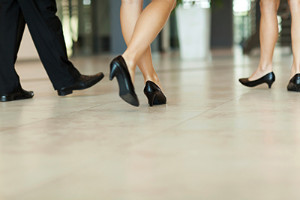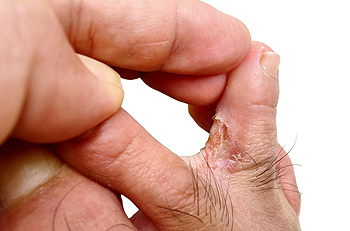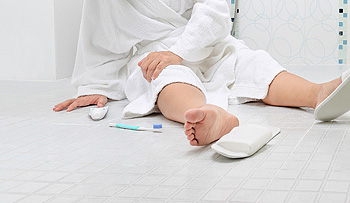Middlefield (860) 349-8500
Wallingford (203) 294-4977
Middlefield (860) 349-8500
Wallingford (203) 294-4977
 Teaching is a profession that typically requires the instructor to stand for the majority of the day. For those in a profession that requires standing for long periods of time, such as a teacher, it’s important to be aware that this may cause general foot pain, as well as the development of an uncomfortable foot condition. Research has indicated this may be prevented by keeping the feet strong, and by wearing comfortable shoes. These can include footwear that have adequate room for the toes to move freely in, and footwear that includes insoles that can provide the feet support and cushioning. It may be beneficial to perform gentle stretching exercises before beginning and ending your day, as this may improve the overall strength of the feet. If you are involved in a profession in which you stand for most of the day, please consult with a podiatrist who can recommend the best shoes to wear for your chosen field.
Teaching is a profession that typically requires the instructor to stand for the majority of the day. For those in a profession that requires standing for long periods of time, such as a teacher, it’s important to be aware that this may cause general foot pain, as well as the development of an uncomfortable foot condition. Research has indicated this may be prevented by keeping the feet strong, and by wearing comfortable shoes. These can include footwear that have adequate room for the toes to move freely in, and footwear that includes insoles that can provide the feet support and cushioning. It may be beneficial to perform gentle stretching exercises before beginning and ending your day, as this may improve the overall strength of the feet. If you are involved in a profession in which you stand for most of the day, please consult with a podiatrist who can recommend the best shoes to wear for your chosen field.
While working on the feet, it is important to take the proper care of them. For more information about working on your feet, contact Dr. Gordon Fosdick from Affiliated Foot Care Center. Our doctor will treat your foot and ankle needs.
Working on Your Feet
Standing on your feet for long periods of time can cause stress and pain in your feet. Your whole body may experience change in terms of posture, back pain, bunions, callouses and or plantar warts. There are ways to avoid these conditions with proper foot care, smart choices and correct posture.
Positive Changes
Negative heeled shoe – Choosing this shoe type places the heel slightly lower than the ball of the foot. These are great for overall foot health. Find shoes that fit you correctly.
Go barefoot – Our feet were not designed to be enclosed for all hours of the day. Try to periodically expose your feet to air.
Eliminate Pain
Foot Exercises – Performing simple exercises, incorporating yoga and doing stretches are beneficial. This will allow increased blood flow to the area and muscles of the foot.
Achilles tendon – Stretching the foot out flat on the floor will relax the calf muscles and tendon. These exercises can be performed almost anywhere. Make sure you add these exercises to your daily regimen.
With a little bit of this information and knowing more about foot health, you will notice changes. Foot stretches and proper footwear will help with pain and prevent further issues.
If you have any questions please feel free to contact our offices located in Middlefield and Wallingford, CT . We offer the newest diagnostic and treatment technologies for all your foot and ankle needs.
 A common fungal infection of the feet is known as athlete’s foot. It is caused by a fungus that thrives in warm and moist environments. These can consist of public swimming pools, locker rooms, and shower room floors. If you are to visit these types of places, it is suggested that appropriate shoes are worn, as this may help to prevent the fungus from entering your skin. There are also other factors that may make it easier for this condition to develop. These may include wearing socks that are wet for the majority of the day, or having a bandage on the skin for an extended period of time which may soften the skin. Common symptoms that are associated with athlete’s foot can include intense itchiness between the toes and on the bottom of the feet, and in more severe cases, blisters may develop. If you feel you have athlete’s foot, it is strongly suggested that you consult with a podiatrist who can guide you toward the proper treatment.
A common fungal infection of the feet is known as athlete’s foot. It is caused by a fungus that thrives in warm and moist environments. These can consist of public swimming pools, locker rooms, and shower room floors. If you are to visit these types of places, it is suggested that appropriate shoes are worn, as this may help to prevent the fungus from entering your skin. There are also other factors that may make it easier for this condition to develop. These may include wearing socks that are wet for the majority of the day, or having a bandage on the skin for an extended period of time which may soften the skin. Common symptoms that are associated with athlete’s foot can include intense itchiness between the toes and on the bottom of the feet, and in more severe cases, blisters may develop. If you feel you have athlete’s foot, it is strongly suggested that you consult with a podiatrist who can guide you toward the proper treatment.
Athlete’s Foot
Athlete’s foot is often an uncomfortable condition to experience. Thankfully, podiatrists specialize in treating athlete’s foot and offer the best treatment options. If you have any questions about athlete’s foot, consult with Dr. Gordon Fosdick from Affiliated Foot Care Center. Our doctor will assess your condition and provide you with quality treatment.
What Is Athlete’s Foot?
Tinea pedis, more commonly known as athlete’s foot, is a non-serious and common fungal infection of the foot. Athlete’s foot is contagious and can be contracted by touching someone who has it or infected surfaces. The most common places contaminated by it are public showers, locker rooms, and swimming pools. Once contracted, it grows on feet that are left inside moist, dark, and warm shoes and socks.
Prevention
The most effective ways to prevent athlete’s foot include:
Symptoms
Athlete’s foot initially occurs as a rash between the toes. However, if left undiagnosed, it can spread to the sides and bottom of the feet, toenails, and if touched by hand, the hands themselves. Symptoms include:
Diagnosis and Treatment
Diagnosis is quick and easy. Skin samples will be taken and either viewed under a microscope or sent to a lab for testing. Sometimes, a podiatrist can diagnose it based on simply looking at it. Once confirmed, treatment options include oral and topical antifungal medications.
If you have any questions, please feel free to contact our offices located in Middlefield and Wallingford, CT . We offer the newest diagnostic and treatment technologies for all your foot care needs.
The condition that is known as cracked heels can occur as a result of cold winter temperatures, or from medical conditions that may include diabetes, psoriasis, or eczema. It can cause pain and discomfort, and in severe cases, the affected area may bleed. There are methods that can be implemented which may help to prevent cracked heels from developing. It is beneficial to wash and dry the feet thoroughly, followed by using a moisturizer on the feet and toes. In mild cases, research has indicated it may help to exfoliate excess dry skin, and this can be done by using a pumice stone. Additionally, it may help to wear shoes that have closed backs, and socks that are made of cotton or wool. If you have this condition, it is suggested that you consult with a podiatrist who can help you to manage cracked heels.
If the skin on your feet starts to crack, you may want to see a podiatrist to find treatment. If you have any concerns, contact Dr. Gordon Fosdick from Affiliated Foot Care Center. Our doctor can provide the care you need to keep you pain-free and on your feet.
Cracked Heels
It is important to moisturize your cracked heels in order to prevent pain, bleeding, and infection. The reason cracked heels form is because the skin on the foot is too dry to support the immense pressure placed on them. When the foot expands, the dry skin on the foot begins to split.
Ways to Help Heal Them
Ways to Prevent Cracked Heels
If you are unsure how to proceed in treating cracked heels, seek guidance from a podiatrist. Your doctor will help you with any questions or information you may need.
If you have any questions, please feel free to contact our offices located in Middlefield and Wallingford, CT . We offer the newest diagnostic and treatment technologies for all your foot care needs.
 Research has shown that falling is common among the elderly population. People who have previously fallen may develop a fear of falling, which may prevent them from accomplishing preferred activities. Falling can happen for a variety of reasons. These often include a lack of physical strength, poor vision, or a muscle imbalance. There are methods that can be implemented that may help to prevent falling. These can consist of installing grab bars in shower and toilet areas, wearing shoes that fit correctly, and participating in a gentle exercise and stretching routine. If you would like information about how falling can affect the feet, it is suggested that you schedule a consultation with a podiatrist.
Research has shown that falling is common among the elderly population. People who have previously fallen may develop a fear of falling, which may prevent them from accomplishing preferred activities. Falling can happen for a variety of reasons. These often include a lack of physical strength, poor vision, or a muscle imbalance. There are methods that can be implemented that may help to prevent falling. These can consist of installing grab bars in shower and toilet areas, wearing shoes that fit correctly, and participating in a gentle exercise and stretching routine. If you would like information about how falling can affect the feet, it is suggested that you schedule a consultation with a podiatrist.
Preventing falls among the elderly is very important. If you are older and have fallen or fear that you are prone to falling, consult with Dr. Gordon Fosdick from Affiliated Foot Care Center. Our doctor will assess your condition and provide you with quality advice and care.
Every 11 seconds, an elderly American is being treated in an emergency room for a fall related injury. Falls are the leading cause of head and hip injuries for those 65 and older. Due to decreases in strength, balance, senses, and lack of awareness, elderly persons are very susceptible to falling. Thankfully, there are a number of things older persons can do to prevent falls.
How to Prevent Falls
Some effective methods that older persons can do to prevent falls include:
Falling can be a traumatic and embarrassing experience for elderly persons; this can make them less willing to leave the house, and less willing to talk to someone about their fears of falling. Doing such things, however, will increase the likelihood of tripping or losing one’s balance. Knowing the causes of falling and how to prevent them is the best way to mitigate the risk of serious injury.
If you have any questions, please feel free to contact our offices located in Middlefield and Wallingford, CT . We offer the newest diagnostic and treatment technologies for all your foot care needs.